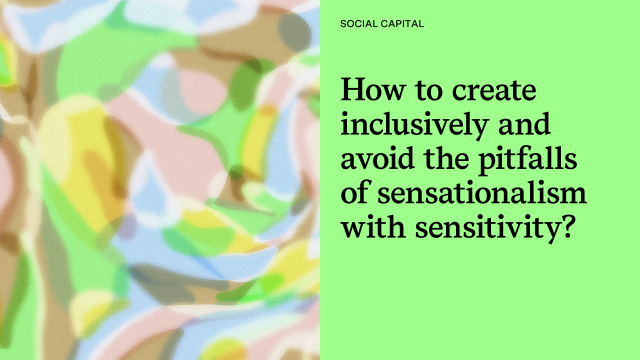
How to create inclusively and avoid the pitfalls of sensationalism with sensitivity?

It’s a tool for identifying whether a company commits greenwashing[1] or greenhushing[2]. In other words, the tool we have developed evaluates the balance between a company’s impact activities and its communications about its impact.
For example, a company that does not make any environmental or social activity part of its operations but publishes frequent communications about social or environmental issues will be classified as greenwashing. A company that publishes communications about social issues but does not undertake any concrete activities to address these issues does not have the credibility nor, above all, the legitimacy to issue communications on these issues.
On the other hand, a company with social and environmental commitments, that has established all kinds of internal activities to reduce its GHG emissions or better manage its production of waste, for example, but never publishes any communications about those initiatives is losing an opportunity to raise awareness and sensitizing its industry, employees and customers.
You can take it here. It’s a survey available for free online that will take around ten minutes to complete.
*This version of the survey is a shorter version of the social capital index. Your score is therefore approximate and may overestimate your true impact or communication intensity but will still provide a good overview of where you stand. For a more precise diagnostic, please contact us in order to take the complete version of the social capital index.
This survey should ideally be taken by the person in the organization with the best overall view of its social, environmental and communication practices. The questions mainly cover the company’s social responsibility, but also tackle media investments, employee benefits and certain human resource practices, for example. It’s important to consult with your internal resources that have expertise in these topics before taking the test.
A company’s negative impact represents the potentially harmful consequences resulting from its operations. Companies can prevent or mitigate these negative impacts by adopting responsible practices.
Amongst these practices are, for example, reducing GHG emissions, the management and reduction of waste produced, actions to reduce the risks of discrimination or harassment within the workplace, favourable work conditions for employees, activities to strengthen cybersecurity and others.
The positive impact a company may generate can be felt beyond its internal operations and aims to make a significant contribution to resolving specific social or environmental problems.
Diverse approaches may be adopted to reach this goal. Philanthropy is a traditional approach, but today we’re seeing an increasing number of innovative methods, such as social marketing or the establishment of impact business models. No matter which approach is chosen, the goal ultimately remains the same: to create positive change that is intentional, sustainable and measurable.
NEVER! We don’t solely want to work with “perfect” companies. We want to transform companies that are interested in improving themselves. The idea of intentionality is our primary criterion in making a decision to work with a company or not. We all have to start somewhere, and we want to be there to help companies who have a desire to contribute to change. Our team is never judgmental. Our desire is to elevate the practices of the companies we work with. Naturally we want to discuss internal responsible practices, but we especially want to talk about impact business models that will significantly transform industries. We also want to equip companies to communicate their business transition or social responsibility initiatives in the right way. Matching the strength of your communications with the actual impact of your activity is a challenge in and of itself, and this is where we can really lend support to our clients.
For Republik, this index represents the concrete result of a positioning we took five years ago. We wanted to create social capital with all of our clients. Social capital is when the actions of a company are beneficial for itself, society and the planet. We wanted to create a bridge between the beliefs, actions and communications of the companies we were working with. The social capital index encapsulates our desire to measure and evaluate the balance between impact activities and communications about them. This index also lets us evaluate improvement in impact practices and communications on a yearly basis amongst our clients and thereby quantify the social capital created by our services.
Definitely! We have shared a Beta version of the index which is, in our opinion, a good start for measuring the balance between a company’s impact and the intensity of its communications about impact. While each question and choice of answer have been considered, weighted and tested amongst various stakeholders, our communication and impact specialists have already decided upon a number of possibilities for improvement of the survey.
For the moment, our survey is aimed at private companies; we are currently working on creating a version that is specific to non-profits in order to take their very different business reality into consideration.
In closing, we invite you to share your opinions on improving the survey and other feedback by writing to us at indice@republik.ca
[1] Definition of greenwashing: Greenwashing occurs when a company makes false or misleading statements regarding the environmental aspects of its activities, products or services.
[2] Definition of greenhushing: The refusal of companies to make public statements about their social or environmental activities out of a fear of being disparaged.